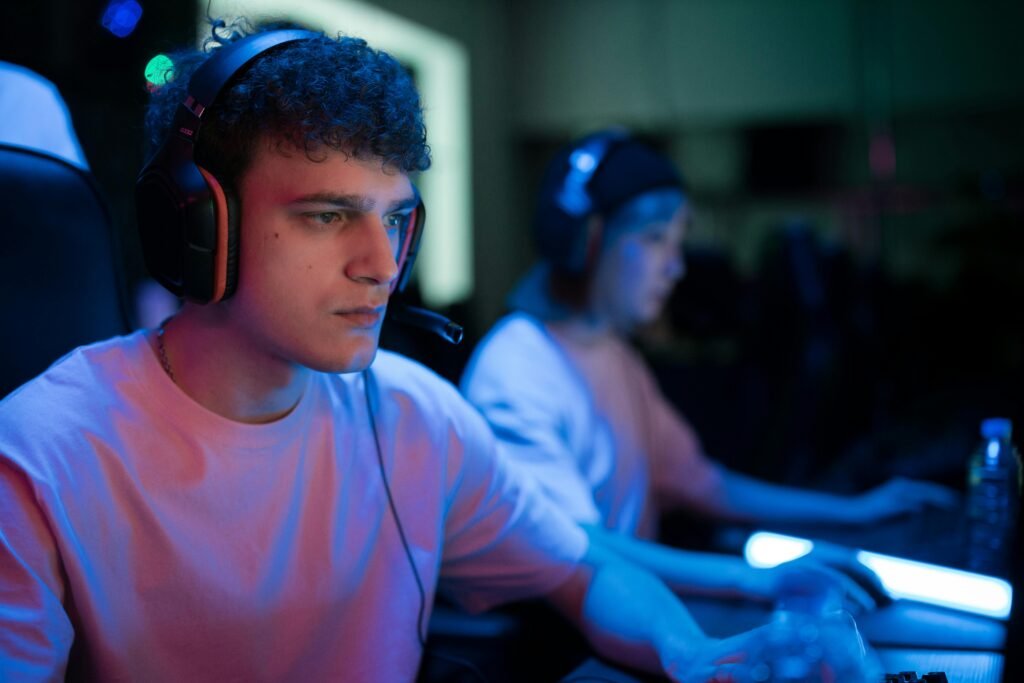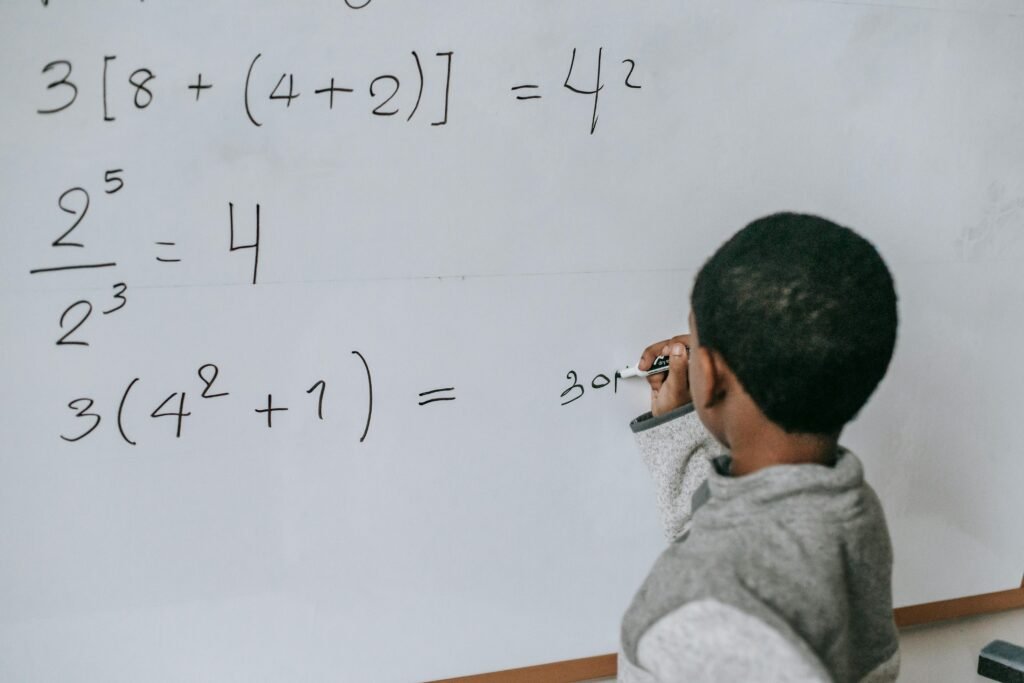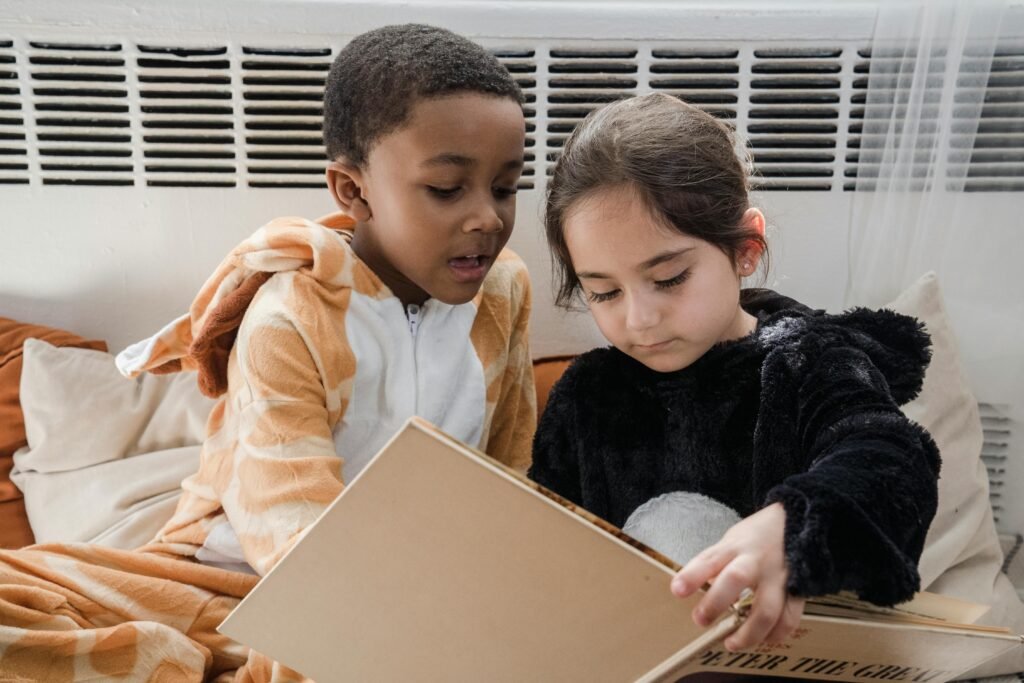Let’s be honest—kids today live in a world we didn’t grow up in. School days don’t end at the last bell anymore. For many students, the day really begins when they hop online, fire up their favorite game, and open Discord. It’s where friends hang out, where jokes fly fast, and where game strategy comes alive. But when all of this happens on a school night, it can affect much more than just a bedtime.
1. 72% of teens aged 13–17 use Discord weekly for gaming-related chats
Discord isn’t just for techies or streamers anymore. Today, it’s one of the most popular places where teens hang out—virtually. And 72% of them are using it every week just to talk about gaming. That’s huge.
Think of Discord as a mix of a group text, a walkie-talkie, and a mini clubhouse. Teens hop in after school or dinner, chat with friends, laugh, plan their next game move, or even join voice chats where they talk non-stop. For many kids, this feels like real social time. It’s their version of “hanging out at the mall.”
But here’s the thing—when this becomes a weekly habit and happens mostly during school nights, it can sneak into homework time, sleep time, and even real-time family connection. Not because kids are bad—but because Discord is designed to keep them coming back.
So what can parents do?
First, talk to your child about why they like Discord. Ask what servers they’ve joined. Listen without judging. When you understand what they enjoy, it’s easier to set boundaries that don’t feel like punishments.
Second, make a simple rule: school work gets done before Discord goes on. Use timers if needed. For younger teens, set a visible time limit for Discord during school nights. It can be as simple as “30 minutes after homework” and then screen off by 9 PM.
Lastly, keep Discord in the open. If it’s on a phone, ask your child to use it in a common space—like the living room—not in bed. This small change makes a big difference.
Remember, this stat isn’t bad—it’s just a sign that Discord is a big part of modern teen life. The goal isn’t to remove it. The goal is to manage it in a way that helps your child stay balanced, happy, and rested.
2. 58% of school-aged gamers stay on Discord past 10 PM on school nights
That’s more than half of all student gamers staying up past 10 PM on a school night—just on Discord. Not gaming. Not watching shows. Just chatting.
Let’s be real—teens staying up late is not new. But when they’re not just texting, but engaging in fast-paced, high-energy chats or group voice calls, the brain doesn’t get the downtime it needs to power down for sleep.
When kids stay up late on Discord, they’re likely not just missing out on sleep. They’re often crankier in the morning, slower to focus in class, and less likely to finish homework or even eat breakfast.
Here’s what you can try:
Start by gently talking about bedtime. Not in a “you’re grounded!” way, but in a “I care about your energy and your brain” way. Teens are much more open when they know you’re not just trying to control them.
You can also introduce a family rule—devices off and screens out of bedrooms by 9:30 PM on school nights. No phones, no Discord, no exceptions. Make it a whole-family habit so your child doesn’t feel singled out.
Use tools like screen time limits built into phones or Discord’s own parental controls. You don’t have to use all of them, but even one or two can help kids develop healthier nighttime routines.
And if your child pushes back, ask them to try it for one week and see how they feel. Often, once they see how much better their mornings are, they’ll agree it’s worth it.
Sleep is everything for growing brains. And staying up chatting every night—even if it’s fun—can hurt more than help. Your job isn’t to take away the fun. It’s to protect their focus, health, and happiness.
3. 1 in 3 teens report being distracted during homework because of Discord pings
Imagine trying to focus on math homework while your phone keeps buzzing. One ping. Then another. Then a funny meme. Then someone calling you into a chat. This is what homework looks like for 1 in 3 teens today.
Discord is not just a chat app. It’s live. It’s fast. It pulls attention like a magnet. And even when a child wants to focus, those pings pull them out of “study mode” again and again.
This constant distraction adds up. Homework that should take 30 minutes now takes an hour. Simple reading becomes frustrating. And worse—kids feel like they’re always behind, even when they’re trying hard.
If you notice your child getting frustrated with schoolwork, don’t assume they’re lazy. Start by asking, “What’s going on around you when you study?” You might learn that Discord is open on another tab. Or on their phone. Or that friends keep calling them in.
Here’s one simple fix: try focused homework sessions. Set a timer for 25 minutes—no phone, no Discord, no noise. After that, a 5-minute break. Then another 25 minutes. This method, often called Pomodoro, works wonders for attention.
Also, have your child turn off notifications during homework time. It sounds obvious, but many teens don’t think to do it. Help them set “Do Not Disturb” for study hours. Show them how to mute servers or block sounds.
Finally, help them create a homework zone—quiet, clean, and away from devices that aren’t being used for work. The less visual temptation, the better their focus will be.
Remember, your child isn’t weak. Discord is designed to grab attention. It’s your job to help them build focus muscles that will help them now—and for life.
4. 47% of students admit checking Discord in the middle of virtual classes
Almost half of students are sneaking peeks at Discord while in class. Not after school. Not on breaks. Right in the middle of lessons.
Virtual learning makes it easy to hide a Discord tab behind a Zoom call or a Google Doc. And it’s tempting—especially when class feels slow, or a friend is sending a funny video.

But the cost is huge. Students miss key ideas. They zone out. They get behind. Then they feel confused or lost. And it’s not because they don’t care—it’s because Discord is that distracting.
Here’s the honest truth: multitasking doesn’t work. When students switch between a class and Discord, they lose focus. And when this happens day after day, it builds bad habits that are hard to break.
So what can you do?
First, talk openly with your child. Say something like, “I know virtual classes can be boring sometimes. But checking Discord makes it even harder to learn. Can we find a way to keep it closed during class?”
Second, help them build structure. Ask them to keep only one window open during class. If they need to take notes, use paper. It’s old-school, but it works.
You can also try turning off Wi-Fi on other devices during class time. Or move devices to another room. The fewer distractions, the better the learning.
Some parents even ask their kids to show them a summary of what they learned after class. Not to quiz them—but to gently hold them accountable. When kids know they’ll be asked, they listen more closely.
The goal isn’t to make your child feel bad. The goal is to help them succeed. And that means making Discord a tool they use after school—not during it.
5. On average, school-night Discord gaming chats last 2.7 hours
Two-point-seven hours. That’s how long kids are spending, on average, chatting on Discord about games—on a school night. That’s almost three episodes of a TV show. Or enough time to watch a full movie. Or finish all their homework and read a book.
When chats run that long, it’s not just about screen time—it’s about mental energy. Kids go from a full day of school to hours of intense conversation, planning, laughing, and fast-paced gaming talk. It’s social, yes—but it’s also exhausting.
When your child does this night after night, it can lead to burnout. You may see it as grumpiness, headaches, or lack of motivation. And sometimes, they don’t even realize they’re tired. They just keep logging in because that’s what everyone else is doing.
Here’s something to try: ask your child to check the clock the next time they open Discord. Help them see how much time they’re really spending. You can say, “Let’s just see—no judgment.” This helps build awareness without starting a fight.
Next, set a fun challenge together. See if they can stick to a 1-hour limit on school nights. You can even create a reward system—like earning extra game time on weekends if they stay balanced during the week.
Also, help your child learn the value of “logging off.” Create a routine that makes it easier—like a set bedtime alarm, a family wind-down activity, or even a nighttime walk. When the brain has a signal that it’s time to rest, it’s easier to shut off the screen.
The key is not to shame them for spending time online. The goal is to help them protect their energy—so they have more focus, more fun, and more real rest.
6. 65% of middle and high school gamers use Discord primarily for game strategy talks
This is a big one. Most kids aren’t just chatting about random things on Discord—they’re actually talking about the game. They’re sharing strategies, asking for help, planning moves, or coordinating teams. It’s focused. It’s detailed. And honestly, it can be really smart.
But it’s also intense.
Game strategy talks can feel like a mental puzzle. Kids want to win, or level up, or beat a team. So they spend hours planning, tweaking, testing. And they’re doing all of this while also trying to juggle school, chores, and rest.
What’s tricky is that it feels productive. They’re learning, right? They’re thinking critically. And in many ways, that’s true. But when this type of deep focus is happening late at night, it starts to drain more than it builds.
So what can parents do?
Start by respecting the brainpower it takes. Tell your child, “I think it’s cool how much you’re thinking through these game plans. That takes real skill.” When you show interest, your child is more open to limits.
Then, set “prime thinking hours.” These are times when it’s okay to do deeper strategy chats—like weekends or early evenings. But after 9 PM, it’s time to turn the brain off, not fire it up.
Also, help your child reflect. Ask them, “Do you think you play better after a good night’s sleep or when you stay up late?” Most kids will realize that sleep helps them think faster. That’s a win.
And if your child is really into strategy, channel that into other learning. Suggest chess, coding, or even building games themselves. These are great ways to use their brain in deeper, more meaningful ways.
It’s not about stopping the strategy—it’s about finding the right time for it.
7. 21% of students say their sleep is “very affected” by late-night Discord gaming
Sleep matters. A lot. And when one in five kids says that Discord is really messing with their sleep, we need to pay attention.
Sleep isn’t just about being rested. It’s about memory, learning, mood, and even physical health. Kids who don’t sleep well are more likely to struggle in class, feel anxious, or get sick more often.
Late-night Discord gaming hits sleep in two ways. First, it keeps kids awake longer. Second, it keeps their brains active right before bed. That means even when they do fall asleep, the quality of that sleep isn’t as deep or healing.
If your child is one of the 21%, here’s how you can help.
Create a “sleep wind-down” routine. About an hour before bed, start dimming lights, turning off screens, and helping the brain shift into calm mode. This could include reading, a warm shower, soft music, or just quiet time.
Set a no-Discord rule 60 minutes before bedtime. This gives the brain time to slow down. You can explain it like this: “If you go straight from high-speed talking to sleep, your brain doesn’t get to shut down. That’s why you feel wired.”
Encourage your child to track their sleep. Use a simple sleep log or a journal. Let them see how they feel after good sleep vs. late-night Discord. The goal is to help them connect the dots, not just follow rules.
And if your child is tired all the time, take a closer look. It might be more than just Discord. But chances are, managing that one app can make a big difference.
Remember, sleep isn’t the enemy of fun. It’s what powers fun—and everything else too.
8. 4 in 5 teens say Discord makes it hard to “log off” due to fear of missing out (FOMO)
FOMO is real. And on Discord, it’s louder than ever. When 80% of teens say they struggle to log off because they’re afraid they’ll miss something—something funny, exciting, or important—we need to take that seriously.
On Discord, chats don’t stop. Servers run 24/7. Someone is always online. There’s always a new message, a new joke, a new conversation. And for kids, stepping away can feel like being left out of the group.
This fear isn’t silly. It’s social survival. But it’s also exhausting. Trying to keep up with every message makes it hard to focus, hard to sleep, and hard to feel present.
So how can parents help?
Start by naming it. Say, “Sounds like you’re feeling FOMO—that makes sense. It’s tough when everyone else is still online.” Just hearing that you get it can help your child feel less alone.
Then, help them set limits together. Not just “turn it off,” but “let’s decide when to be on and when to take breaks.” You can even use phrases like “Discord breaks” or “offline time” to make it feel more like a healthy choice, not a punishment.
Teach them to set their own boundaries in servers. That might mean muting certain channels, turning off @everyone notifications, or even leaving chats that feel too active. These tools are built into Discord—they just need to learn how to use them.
And lastly, offer alternatives. If they’re afraid of missing out, give them something to look forward to offline. A movie night, a weekend plan, or even just a family game. Social fun doesn’t only have to happen on screens.
Kids need help learning that it’s okay to miss out. That real connection doesn’t disappear when you log off. In fact, sometimes it gets stronger.
9. 89% of student gamers have joined a Discord server without parental knowledge
This is a big one. Almost 9 out of 10 student gamers are joining Discord servers without their parents even knowing. That means they’re entering chat rooms full of strangers, conversations, and content—often unfiltered.
Discord servers can be public or private. Some are safe spaces made by friends. Others are huge, open communities where thousands of people post at once. Without knowing which server your child is in, it’s hard to know what they’re seeing—or who they’re talking to.
This isn’t just about “bad people.” It’s also about overwhelming content, inappropriate jokes, peer pressure, and exposure to things they may not understand yet.
So how can you open the door without shutting down trust?
Start by asking—not accusing. Say, “I heard that most kids join Discord servers on their own. Have you joined any? I’d love to know which ones you like.” Make it a conversation, not a check-up.
Once they open up, ask to see the servers. Not to snoop—but to learn. Ask, “What kind of stuff do people talk about here? Do you feel safe?” This helps your child feel like you’re in it with them, not against them.
Teach your child how to spot red flags—like if someone asks personal questions, pressures them to join voice chats, or shares disturbing content. Tell them they can always come to you without fear, even if something felt “weird.”
Also, consider setting a “server check” rule. Once a week, go through their joined servers together. Ask them to show you new ones and explain why they joined. Keep it light but regular.
You don’t have to know everything about Discord. You just need to help your child build safe habits, ask good questions, and stay alert while they explore.
10. 37% of students have chatted with strangers on Discord during school nights
This stat is a wake-up call. More than a third of students are not just in public chats—they’re actively talking to people they’ve never met. On school nights. While you think they’re asleep, doing homework, or watching videos.
Discord isn’t like texting a friend. It’s often anonymous, fast, and open. And when kids join large gaming servers or community chats, they’re instantly exposed to thousands of strangers.
Sometimes, these conversations are harmless. But sometimes, they’re not. There are risks—bullying, grooming, misinformation, or just being pulled into drama or chaos that doesn’t belong in a kid’s world.
Here’s how to respond without making your child feel cornered.
Ask, “Have you ever talked to someone you didn’t know on Discord?” Then pause. Let them answer honestly. Most kids don’t realize it’s a big deal. They’re just following the flow of a chat.
Next, explain the risk clearly and calmly. Say, “You’re smart, but strangers online can pretend to be anyone. I’m not trying to scare you—I just want to make sure you’re safe.”

Set a family rule: no private messages (DMs) with strangers. Show them how to disable direct messages in server settings. You can say, “This just blocks random people from messaging you without permission.”
Also, teach your child to ask: “Would I talk to this person the same way if a parent or teacher were standing behind me?” If the answer is no—it’s probably not a safe conversation.
Help your child think like a leader. Say, “Your online space should be like your room—you decide who gets to come in. You don’t have to talk to everyone.”
When kids understand that privacy = power, they make smarter choices. And that helps keep their nights—and their minds—safe.
11. 42% of parents are unaware of how often their kids use Discord
This one isn’t about the kids—it’s about us, the adults. Nearly half of all parents don’t actually know how often their child is on Discord. Not because they don’t care. But because Discord feels invisible.
It runs quietly in the background. It looks like “just chatting.” It doesn’t have big sounds or flashy screens. And it’s easy for kids to say, “I’m just checking something” when they’ve been on it for hours.
So how do we close the gap—without becoming overbearing?
Start with curiosity. Ask, “How often do you usually hop on Discord?” Not in a nagging tone—but like you’re truly interested. This opens a door instead of building a wall.
Next, ask to watch for 10 minutes. Say, “Can I sit with you and see what Discord is like?” Let your child lead. Watch how they chat. Ask what different buttons do. Show them that you’re here to understand, not control.
Also, invite them to teach you something about Discord. Kids love being the expert. It builds trust. And it gives you a window into their world.
Then, set a rhythm for check-ins. Once a week, just ask, “How’s Discord going this week? Anything new in your servers?” Make it a regular part of your conversations—like talking about school or sports.
And if you’re truly in the dark, ask your child to help you install Discord on your own device. Not to spy—but to learn. You’ll understand it better, and your child will respect that you’re paying attention.
The more you know, the more you can help guide—not just watch. And when kids feel that you care, not just control, they’re more likely to come to you on their own.
12. Peak Discord activity among student gamers is between 9 PM and 12 AM
Those late-night hours? That’s when it all happens. Between 9 PM and midnight, Discord gets loud, fast, and full of energy. It’s the digital version of a midnight hangout—and your child is likely part of it.
Why these hours? Simple. Homework’s done (or skipped). Parents are winding down. The house is quiet. And friends are online. It’s the perfect storm.
But the brain doesn’t work like that. After 9 PM, your child’s body wants to rest. Their mind needs to slow down. Instead, Discord pulls them into fast conversations, jokes, arguments, and gaming plans.
This late-night stimulation makes it harder to sleep, harder to wake up, and harder to stay focused the next day. You’ll see it as grumpy mornings, rushed breakfasts, and poor classroom focus.
So what can you do?
Set a Discord curfew. Make it clear: after 9:30 PM, all chats are off. No exceptions on school nights. Frame it as a health choice, not just a rule. Say, “Your brain is amazing—and it needs sleep to grow stronger.”
Help your child find quiet alternatives at night. Audiobooks. Music. Journaling. A warm shower. These send a signal that the day is ending—and help their body prepare for sleep.
You can also set up “downtime” on phones. Most devices now let you lock access to apps after a certain hour. Use this feature together with your child. Let them choose the curfew hour with your guidance. That gives them more ownership.
Finally, model it yourself. If you’re scrolling at midnight, your child notices. Try logging off early too. Lead by example.
These night hours are tempting. But they come at a cost. And by setting clear boundaries, you’re not cutting out fun—you’re protecting energy for what matters most.
13. 55% of students report feeling more tired in school after active Discord nights
It’s no surprise—over half of students say they feel tired at school after a night full of Discord activity. Not just gaming, but chatting, watching memes, replying to messages, and flipping through conversation after conversation.
Think about it: even if they get six or seven hours of sleep, their brains haven’t rested properly. Their sleep is lighter, more fragmented, and often filled with overstimulation. That tiredness doesn’t just make them sleepy—it makes learning harder. It makes moods swingier. It makes mornings miserable.
Tired brains can’t remember things well. They zone out in class. They get irritated faster. And when this tiredness builds up over days and weeks, school feels overwhelming.
Here’s how you can step in, calmly and smartly.
First, observe your child in the morning. Do they seem dazed, slow, or extra quiet? That’s often a sign of overstimulation the night before. Bring it up kindly: “You seem super tired this morning—do you think Discord kept you up a bit?”
Next, ask them to rate their energy every morning for a week—just 1 to 10. At the end of the week, ask them to compare that to how much Discord time they had the night before. Let them make the connection.
Help them reclaim their energy. Offer “tech-free evenings” on a couple nights a week—just to test it. Use it as an experiment, not a punishment. If they feel better in class the next day, you’ve got a great reason to keep going.
And if school tiredness becomes a regular problem, loop in their teacher or counselor. It’s not tattling—it’s teamwork. Together, you can create better support systems so they don’t fall behind.
Tiredness is often just a signal. The solution isn’t just more sleep. It’s better boundaries. And your support makes all the difference.
14. 30% of students use Discord voice chat while doing homework
Nearly a third of students are in voice chats on Discord while doing homework. That means they’re talking, listening, reacting, and trying to solve math problems or write essays at the same time.
Let’s be honest—this doesn’t work well.
The brain isn’t built to handle multiple streams of information at once. When students try to focus on schoolwork and talk to friends, both get watered down. Homework takes longer. Mistakes happen. And the learning just doesn’t stick.
But to kids, it feels normal. It feels social. And sometimes, they say, “It helps me focus.” What they usually mean is—it makes the homework feel less boring.
So instead of just saying “no Discord during homework,” try this:
Ask: “When you’re doing homework with Discord on, how do you feel? Focused or distracted?” Get them to reflect honestly. Most will admit that it’s harder to concentrate.
Try a “voice chat after work” rule. Say, “Do your homework with full focus, and then you can jump into voice chat when you’re done.” It’s a win-win—they finish faster and still get their social time.
If they must have sound, offer alternatives. Lo-fi music, ambient noise, or even white noise can provide a calming background without pulling their attention away.
Also, help them create a workspace that feels good—clean desk, no Discord tab open, phone flipped over. Small changes make big impacts on focus.
And remember, this isn’t just about homework. It’s about building a skill that will help them forever: deep work. The kind of focus that leads to better learning, better thinking, and more confidence.
Voice chat has its place. But not while trying to solve for X.
15. Only 18% of parents use parental controls on Discord
That’s a small number—less than 1 in 5 parents are using the tools that are built into Discord to help guide safe usage. And many don’t even know those tools exist.
Discord offers features like blocking DMs from strangers, restricting explicit content, turning off friend requests, and setting privacy levels. But because the app feels complicated or unfamiliar, most parents never set it up.
This leaves kids exposed to messages, content, and people they shouldn’t be dealing with—especially late at night when supervision is low.
Here’s how to take action without becoming the “strict parent.”
Start by learning the controls yourself. Go to Discord’s safety center and read their guide for parents. It’s simple and clear. Then, sit down with your child and say, “Let’s go through some settings together—not to spy, but to protect.”
Set up Safe Direct Messaging. This filters out inappropriate content before it even gets to your child’s inbox. It’s one toggle—and it makes a big difference.
Turn off DMs from server members. Unless your child knows someone personally, they shouldn’t be getting private messages from them.
Help them build a clean friends list. Go through their contacts and ask, “Do you know this person in real life? Would you feel safe meeting them in person?” If the answer is no—it’s time to remove.
If your child resists, explain that this isn’t about punishing them. It’s about helping them stay in control. Say, “The safer your Discord is, the more freedom you’ll have to use it well.”
When you set up the right tools, you’re not just protecting your child—you’re empowering them. And that gives you both peace of mind.
16. 1 in 4 teens say Discord chats are more important than school group projects
This stat tells us something powerful. For many teens, online chats—especially with their gaming or friend groups—feel more urgent, more rewarding, and more exciting than their schoolwork.
They’ll jump into a Discord chat the second a notification hits. But they’ll delay, avoid, or half-heartedly show up for school projects, even when they’re in a group.
Why? Because Discord gives them immediate feedback. Friends reply fast. They feel seen, heard, and included. School projects, on the other hand, feel slow, awkward, and full of pressure.
This doesn’t mean kids are lazy. It means they’re drawn to what feels more engaging.
So how do we shift their mindset—without nagging?
Start by acknowledging the truth: “I get why you love Discord chats. They’re fun, and people actually talk back.” When kids feel understood, they listen better.
Then, connect school work to real-life success. Ask, “What if you treated your school group like a team in a game? What roles would everyone play? How would you keep it fun?” Help them apply their teamwork mindset from Discord to the classroom.
Also, set limits based on effort. Say, “If you give 30 minutes to your project, then you get 30 minutes of Discord.” This keeps their energy balanced.
If they truly dislike school group work, help them talk to their teacher. Maybe their role isn’t a good fit. Maybe they need clearer expectations. Learning to communicate is part of the growth.

The goal isn’t to make school more exciting than Discord. That’s a tall order. But we can teach kids how to bring the same energy and focus to both—and that makes them stronger learners and collaborators.
17. 61% of student users report that Discord increases their social connection
This is one of the most positive stats—and it’s important. Over half of students say that Discord helps them feel more connected to their friends. And that makes sense. It’s not just a chat app. It’s a space where kids joke, plan games, share memes, and talk about things they care about.
For many students—especially those who are shy, anxious, or feeling isolated—Discord can be a lifeline. It gives them a place to belong. A voice. A way to stay in touch after school hours.
That connection matters. It helps reduce loneliness. It builds confidence. It helps kids feel like they have a group. But too much of a good thing can still be… too much.
The problem isn’t that Discord builds connection—it’s when that becomes the only form of connection. Or when it replaces real-life communication, sleep, and school.
So what can parents do?
Start by celebrating the good. Say, “I’m glad Discord helps you feel close to your friends. That’s really important.” This builds trust.
Then, ask gently: “Do you feel like you need Discord to stay close to them, or do you also talk in real life or at school?” Help your child reflect on the balance of online vs. offline friendships.
Encourage them to mix both. For example, say, “Why not plan a real hangout this weekend?” Or “Next time you’re on Discord, invite one of your friends to come over too.”
Also, check if Discord friendships feel positive. Ask, “Do you feel better or worse after chatting on Discord?” If your child is always drained or stressed, it might not be the healthy connection they think it is.
Connection is beautiful. But it should build your child up—not wear them down. When you support their need to belong, you also help them find better ways to balance it.
18. 33% of teens have experienced online drama in Discord servers on school nights
One-third of teens have faced drama in Discord chats—at night, during school days. That means arguments, hurt feelings, gossip, or even full-blown fights while they’re supposed to be winding down or doing homework.
Online drama might sound minor to adults, but to kids, it feels huge. A fight in a chat can ruin their focus, upset their emotions, and keep them awake for hours thinking about what someone said or didn’t say.
And because Discord is so fast, these problems can explode quickly. A small comment turns into a thread. People take sides. Screenshots get passed around. And your child is caught in the middle—alone in their room, stressed out, and still expected to get up for school in the morning.
So what can you do?
First, create a safe space to talk about online conflict. Say, “Has anything weird or stressful ever happened in one of your Discord chats?” Then just listen. The goal is to understand, not fix right away.
If your child shares something upsetting, validate their feelings. “That sounds really tough. I can see why you felt upset.” Then, help them think through what to do—mute the chat, block someone, or just take a break.
Teach your child how to respond calmly, or not at all. Sometimes, the smartest thing to do is log off. Let them know that walking away isn’t weak—it’s strong.
Also, check in regularly. Ask, “How are your servers feeling lately? Chill or chaotic?” This helps you spot drama early before it gets out of control.
If the same drama keeps coming back, it might be time to leave that server. Help your child see that their peace of mind is more important than staying in a toxic space.
Nighttime drama doesn’t just hurt sleep—it chips away at confidence. Help your child build tools to protect their emotions and stay strong.
19. 72% of high school boys use Discord compared to 41% of girls
This stat shows a big gap—almost three-quarters of high school boys are on Discord regularly, while less than half of girls are. That doesn’t mean girls don’t game or chat. But boys are clearly leading in usage, especially in gaming spaces.
Why does this matter? Because it tells us that Discord habits may look different based on gender. Boys may be spending more time in competitive game chats, team planning, and casual conversations late into the night. Girls may be on other platforms—or using Discord in smaller, more private groups.
Parents of boys may need to be extra alert to time spent, server activity, and late-night gaming culture. Parents of girls might still need to pay attention—but the use may be quieter, more social, or in niche interest groups.
So how do you approach this?
Don’t assume. Ask your child, “What do you usually do on Discord?” And then follow up with, “Do your friends use it a lot too?” The answers may surprise you.
If you have a son who uses Discord often, explore how he uses it. Is he in voice chats nightly? Is he part of big gaming servers with constant messages? Or does he use it more casually?
For girls, make space for deeper conversations. Some girls may feel pressure to act a certain way in chats. Others may use Discord to talk about real emotions. Make sure they know they can always come to you, no matter what’s said in the chat.
No matter the gender, the advice stays the same: keep an open line of communication, check in often, and treat Discord like part of your child’s social life—not just a tech app.
And if you’re a parent of both boys and girls, remember: it’s not about rules being different—it’s about the conversation being personal.
20. 48% of students use Discord on mobile devices while in bed
Almost half of students are lying in bed with Discord still open on their phones. Lights are off. Screens are glowing. And chats are going strong.
This means kids are staying mentally active right up to (and often past) their bedtime. And it’s not just bad for sleep. It also trains the brain to stay alert when it should be shutting down.
Using Discord in bed is like trying to fall asleep at a party. The messages keep popping up. The screen lights up your face. And even after you log off, your mind keeps running through what was said.
So how do you stop this habit—without a nightly battle?
Start by changing the location of screens. Create a “no phones in bed” rule. Not just for kids—for the whole family. Make the bedroom a place for sleep, not screens.
Set up a charging station in the hallway or kitchen. Tell your child, “We all leave our phones here overnight. It helps our brains rest better.” Normalize it.
Use screen limit tools to shut off Discord after a certain time. Many phones now have built-in timers. Set it for 9 or 9:30 PM and label it “Sleep Zone” to make it feel like a choice, not a punishment.
Help your child build a bedtime routine that replaces Discord. Reading, calming music, journaling, or just talking about their day. These habits are easier to keep when there’s a plan.
And if your child says, “But I use Discord to relax,” dig deeper. Say, “What about it helps you relax?” You might find they’re looking for comfort, friendship, or escape. Once you know that, you can help meet that need in a healthier way.
Bedtime should be the quietest time of the day. Discord keeps it loud. You can help make that switch—with love, patience, and a little planning.
21. 29% of school-night gamers say they feel “addicted” to Discord chats
When nearly a third of kids say they feel “addicted” to Discord chats, that’s something we have to take seriously. This isn’t just about screen time—it’s about emotional attachment, brain chemistry, and habits that are getting hard to break.
Addiction sounds like a big word, but for kids, it usually means this: “I can’t stop checking it, even when I know I should.” That’s not laziness. That’s how powerful digital habits work.

Discord is designed to keep people engaged. The notifications. The endless scrolling. The surprise of who’s online. It creates a constant loop in the brain—like, “What did I miss? Who’s talking now? Did someone reply?” This loop becomes hard to ignore.
For kids, this means they might try to log off but find themselves coming back again and again. It feels like something they have to do—even when they’re tired, distracted, or behind on homework.
So what can you do to help your child break this cycle?
Start with compassion. Don’t call them “addicted” or “obsessed.” That only builds shame. Instead, say, “It seems like Discord has a really strong pull on you. Want to talk about it?” That keeps the door open.
Help them name the feeling. Is it anxiety? Fear of missing out? Boredom? Loneliness? Once they understand why they keep going back, it’s easier to find other ways to meet that need.
Build in tiny wins. For example, ask, “Could you go one evening without Discord, just to see how it feels?” If they do it, celebrate it. Let them feel proud of being in control.
Create friction. This means making it slightly harder to access Discord. Remove shortcuts from their home screen. Turn off auto-login. These little steps can interrupt the loop and help the brain reset.
Finally, talk openly about balance. Say, “I’m not saying you can’t use Discord. I’m saying I want you to feel in control of it—not the other way around.”
When your child feels empowered instead of scolded, they start making smarter choices. And that’s the first step toward breaking habits that don’t serve them.
22. 64% of Discord gaming chats involve multiplayer games like Minecraft, Roblox, or Fortnite
Multiplayer games are a major part of why kids love Discord. Nearly two-thirds of gaming chats are focused on games like Minecraft, Roblox, or Fortnite—games where collaboration, competition, and communication happen constantly.
This is where Discord becomes more than just a chat app—it becomes a control room. Kids coordinate attacks, build strategies, trade tips, and even host live sessions while playing. It feels like a team sport, and Discord is the locker room.
And honestly? That’s not all bad. These games teach skills—problem-solving, planning, creativity, and sometimes leadership. When used well, Discord can support this growth.
But here’s the problem: when these game chats stretch into school-night hours, kids don’t get to shut off. Their minds stay in “game mode”—always thinking about the next step, the next move, the next mission.
This can hurt their ability to rest, study, or be present at home. It turns their brain into a never-ending game engine.
So how do you handle this smartly?
First, recognize the good. Say, “I love that you’re learning teamwork and thinking fast in your games.” This shows respect for their interests.
Next, set a game schedule. Say, “Let’s agree on which nights are okay for gaming—and which ones are just too close to school deadlines or bedtime.” This creates clarity.
Help your child prepare a “cool down” routine. After they log off the game and Discord, give them at least 30 minutes of calm time—reading, talking, or even quiet music. This gives their brain time to slow down.
And if your child is leading game chats or hosting a server, help them manage that role. Ask, “Is it stressful to always be the one running things?” They may need help setting boundaries with their own gaming group.
Remember: games are not the enemy. But the timing and intensity matter. With the right guidance, your child can enjoy multiplayer fun—and still show up ready for school.
23. 35% of students admitted sneaking Discord use after lights-out
Over one-third of students are secretly using Discord after they’re supposed to be asleep. This usually means they’re hiding under covers, chatting in the dark, whispering in voice channels, or scrolling through messages at midnight.
This “sneaky screen time” is one of the biggest challenges for families. Kids know they’re not supposed to be online. But the pull is strong—and the fear of missing out or not replying fast enough is even stronger.
This habit affects everything. It disrupts sleep. It builds secret behavior patterns. It makes mornings miserable. And worst of all—it makes kids feel like they’re living a double life.
So how do you change this without starting a nightly battle?
Start with empathy. Say, “I get it. It’s hard to put the phone down when you feel like everyone else is still online.” This shows you understand before you try to change.
Then, address the sneaking directly. Not with shame, but with honesty. Say, “When you sneak Discord at night, your brain doesn’t get to rest. That’s not just about rules—it’s about your health.”
Set nighttime tech boundaries as a family. Everyone plugs in their devices outside the bedroom—parents too. Make it a norm, not a punishment.
If you’re worried your child is still sneaking devices, use small signals—like a phone box, charging station, or screen curfews using built-in timers. These tools help create accountability without constant conflict.
Also, talk about why they’re staying up. Are they bored? Lonely? Avoiding something? Sometimes sneaky behavior is a sign of something deeper. The goal isn’t just to stop the habit—but to understand the need behind it.
When your child sees that you care more about them than the screen, they’ll start making choices that protect their own well-being.
24. 56% of kids feel pressure to stay online longer when friends are gaming
This is peer pressure in a new form. Over half of kids say they feel like they have to stay on Discord longer—just because their friends are still online. It’s not always that someone tells them to stay. It’s more like an unspoken rule: “Don’t be the first one to log off.”
For kids, this can be really tough. They don’t want to seem boring. They don’t want to miss the inside jokes. And they don’t want their friends to think they’re quitting too soon.
But this pressure can lead to overuse, lost sleep, anxiety, and even feelings of guilt or stress when they do log off. It turns a fun chat into a mental tug-of-war.
So how can parents help kids stand strong in a kind way?
Start by talking about social stamina. Say, “It’s okay to leave a chat when your brain says it’s tired—even if others are still there.” Teach your child that they get to decide when enough is enough.
Help them plan exits in advance. Say, “Before you log in tonight, let’s pick a time when you’ll stop. That way, you’re not stuck in that ‘I don’t know when to leave’ feeling.”
Practice exit lines together. “Hey guys, I’ve got to go—early morning tomorrow.” Or “Logging off now. Catch you all later!” These little scripts give your child the confidence to leave without stress.

Also, build in rewards for logging off on time. Extra game time on the weekend. A later bedtime on Fridays. Small wins help motivate healthy habits.
Most importantly, show that walking away doesn’t mean walking out of friendships. The real friends? They’ll still be there tomorrow.
Learning to say “I’m done for now” is one of the strongest skills your child can learn—and it starts with your support.
25. 44% of teachers say late-night Discord use affects student engagement
Teachers are on the frontlines, and nearly half of them say they can tell when a student has been up too late on Discord. Not just because they look tired—but because their brain is elsewhere.
Students who use Discord late into the night often show up to class unfocused, distracted, or emotionally “off.” They might zone out during lessons, forget assignments, or seem irritated for no clear reason. And teachers notice.
This isn’t about blaming kids—it’s about understanding how modern habits are affecting classroom performance in real ways.
So, what can families do to support both sleep and school success?
First, loop in your child’s teacher—especially if you suspect Discord is interfering with learning. Say, “We’re trying to help [Child’s Name] balance school and screen time. Have you noticed anything off lately?” That builds partnership instead of tension.
Second, make mornings matter. If your child is groggy, talk about it. “Hey, this morning seems rough. Did you stay up chatting again?” Not in a shaming tone—but in a curious, calm one.
Help your child understand the impact of late-night chatting by asking, “Do you feel like you’re learning as much when you’re tired?” If they don’t see the connection, suggest a one-week experiment: no Discord after 9 PM, and compare how they feel in class.
Also, remind them that teachers want them to succeed. “Your teacher isn’t mad if you’re tired—they just want you to have the energy to show your real potential.”
Create a bedtime tech habit that protects their school energy. Whether it’s a reading break, wind-down chat, or screen-free bedtime routine, the goal is to help them show up ready to learn.
School is more than just grades. It’s a place where kids grow. And the right boundaries at night help that growth happen without a screen stealing the show.
26. 38% of parents have never heard of Discord
That’s a big number—more than a third of parents have never even heard of the platform their kids may be using daily. This stat is not meant to shame anyone. It just shows how fast the digital world moves—and how easy it is for parents to feel left out.
Discord may be the most important app in your child’s world—and you might not even know what the icon looks like.
The good news? It’s never too late to catch up.
Start by simply Googling “What is Discord?” Or better yet—ask your child. Say, “Hey, I’ve heard about Discord, but I really don’t know how it works. Can you show me?” Most kids love showing off their digital world.
Next, create a Discord account yourself. Join a server (even a parenting one!) and explore. You don’t need to become a Discord pro—but just knowing how it feels gives you a huge advantage in guiding your child.
Ask questions like: “What servers do you like?” or “How do you know if a server is safe?” The more open you are, the more they’ll share.
Also, check if other parents in your community are aware. You’d be surprised how many are in the dark. Consider sharing tips, articles, or even having group discussions.
The digital divide between kids and parents doesn’t have to be wide. With a little effort, you can close that gap—and your child will feel safer knowing you understand the space they live in.
Knowledge is power. And even a small step toward understanding Discord can make you a more confident, connected parent.
27. Students in grades 6–9 are the most active Discord users on school nights
Middle schoolers and early high school students—those in grades 6 through 9—are using Discord the most on school nights. This is a critical age group. Their brains are still developing. Their identities are forming. And they’re just beginning to explore independence.
This is also the time when peer pressure, social anxiety, and digital habits start becoming more powerful than family routines.
These kids aren’t just chatting. They’re living on Discord after school. They’re forming friend groups, trying to fit in, running into drama, and building habits that may last years.
So how do you support them without being “the bad guy”?
Start with structure. Kids this age still need it—even if they fight it. Create evening routines that include homework, meals, family time, and then a set window for Discord. Make it predictable. Safe. And non-negotiable.
Next, have regular “tech talks.” Not lectures—just conversations. Ask, “What’s the funniest thing that happened on Discord this week?” or “Anyone acting annoying in your servers?” Keep it casual. Keep it open.
Also, help them build awareness. Say, “Let’s track your Discord use this week. Not to judge—just to see how it’s affecting your energy.” Let them notice the patterns.
Middle schoolers often act like they don’t care—but they do. When you talk to them like a partner, not a police officer, they start taking ownership.
And remember—this age group needs the most guidance. They’re not quite ready to manage it alone. Be there. Ask questions. Set boundaries. And celebrate when they make smart choices.
This is the moment to shape digital habits—for life.
28. Only 9% of student users regularly log off Discord before 9 PM
That’s a tiny number. Only 9% of kids using Discord are logging off before 9 PM. The rest? They’re staying on through the night—sometimes well into the early hours of the morning.
This tells us that “late” is becoming the norm. That Discord is filling the evening hours with nonstop talking, planning, and reacting.
It also shows that many kids don’t have nighttime boundaries. Not because they’re rebellious—but because no one helped them create a clear shutdown time.
So what’s the fix?
Build a family “wind-down hour.” Choose a time—8:30 or 9:00 PM—and name it. Call it “Quiet Time” or “Tech Break” or something playful like “Offline O’Clock.” This makes it a shared experience.
Create rituals. A snack. A game. A quick walk. Something that marks the end of screen time and the beginning of calm. Routines matter more than rules.
Use timers and tech tools to help. Set up app limits on phones and computers. Label them with positive messages like “Time to Rest” so it feels like a reminder, not a block.
Talk to your child about why this matters. Say, “Logging off earlier gives your brain time to recharge. You’ll feel more focused, more creative, and less stressed.”
And finally, make it a family rule. Kids shouldn’t be the only ones logging off. Show them that you also take screen breaks. That your health matters too.
You don’t need to force a shutdown. You just need to lead one. When only 9% are doing it—you have a chance to help your child stand out by standing strong.
29. 50% of school-night Discord chatrooms have at least one user under age 13
This stat is alarming—and important. Half of all school-night Discord chatrooms include users under the age of 13. That’s a big problem, because Discord’s official age requirement is 13+, and younger kids often lack the maturity to navigate the complex, sometimes chaotic world of open chats.
These underage users are often pretending to be older just to join the platform. Some may be invited by older friends. Others might stumble in on their own. And once they’re in—they’re exposed to conversations, memes, and messages that may not be safe or appropriate.
This isn’t just about “bad content.” It’s about emotional readiness. Kids under 13 may not know how to deal with online teasing, cyberbullying, inappropriate language, or strangers asking questions that feel uncomfortable.
As a parent, you must take this seriously—even if your child seems tech-savvy or “mature for their age.”
Here’s what you can do.
If your child is under 13 and using Discord, it’s time for a reset. Sit down and say, “I know you’ve been using this app, but it’s not made for your age group. That’s not a rule I made—it’s a safety guideline they made. Let’s take a break from it and find something safer together.”
You can offer age-appropriate alternatives for social connection, like Roblox chat with restrictions, moderated game clubs, or even group Zooms with friends under adult supervision.
If your child is over 13 but chatting with younger users, have a talk about responsibility. Say, “When you’re in a server and see someone who’s clearly underage, what do you do?” Help them think through how to respond—or whether it’s time to leave the space.
Also, teach your child how to spot red flags. If someone says they’re younger, acts immature, or asks strange questions, it’s okay to mute, report, or leave the conversation.
And finally, check the servers your child is in. Ask, “Do you think these spaces are full of kids your age?” If not—it might be time to move on.
Younger users don’t belong in chaotic digital spaces. Your guidance can keep everyone safer—while helping your child develop a stronger sense of digital responsibility.
30. 70% of students say Discord is more fun than school-related communication apps
This last stat? It’s a real eye-opener. Seven out of ten students say that Discord is simply more fun than tools like Google Classroom, Microsoft Teams, or school forums.
It’s no surprise. Discord is colorful, customizable, fast, funny, and filled with emojis, memes, and voice chat. School platforms? Not so much. They’re usually gray, structured, slow, and limited to assignments and announcements.
But here’s the challenge: when kids see school apps as boring and Discord as exciting, it’s harder for them to stay engaged with learning tools. They feel forced to use one and free to enjoy the other. That creates a mindset where learning becomes a chore—and chatting becomes the reward.
So how do you shift that balance?
You don’t have to make school platforms cooler than Discord. That’s not realistic. But you can help your child build a healthier relationship with both.
Start by helping them see the purpose of each tool. Say, “Discord is for fun. School apps are for focus. One builds your social life. The other builds your future.” When kids understand why they use each one, they start using them with more intention.
Encourage your child to design their own learning space. Brighten up their digital desk. Let them use a cool background during class. Small details can help make school feel more personal.
Help them schedule time for both. Say, “Let’s do 45 minutes of homework, then you can hop into Discord for 20.” This structure gives them balance and lets them enjoy both sides of their digital life.
Also, explore educational Discord servers. Yes—they exist! There are Discord communities built around coding, science, books, and even homework help. If your child enjoys the Discord format, let them use it to learn, too.
And most importantly, talk to teachers. If school platforms feel lifeless, ask if they’re open to ideas. Could kids make short videos instead of essays? Could a project include digital collaboration in a fun format?

When students feel like learning can be creative and interactive—even just a little—they stop seeing it as the opposite of fun.
Because at the end of the day, fun and learning don’t have to be on separate apps. You can help your child find both—in the same place.
Conclusion:
Discord is a powerful space. It’s where kids laugh with friends, build epic game plans, share jokes, and feel connected in ways that matter to them. It’s social, fun, and—let’s be honest—pretty addictive.
But when it takes over school nights, cuts into sleep, distracts from learning, or pulls your child into unhealthy habits, that’s when it becomes more than just an app. That’s when it starts shaping how your child thinks, learns, and grows.
And that’s where you come in.



